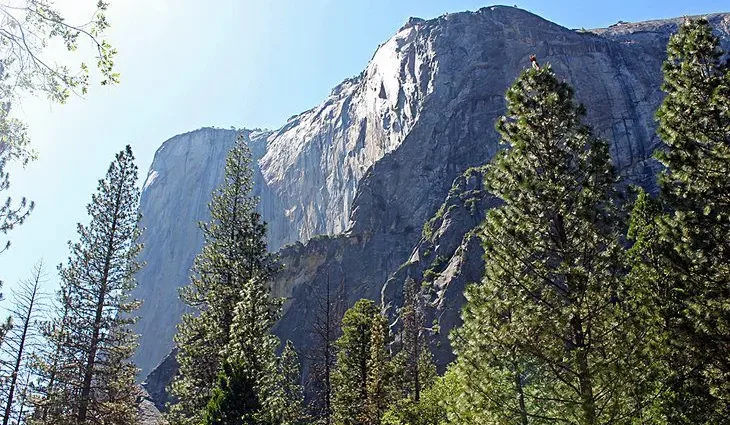Contents
- 1. Yosemite Falls
- 2. Half Dome
- 3. El Capitan
- 4. Tunnel View
- 5. Glacier Point
- 6. Bridalveil Falls
- 7. Hiking
- 8. Climbing
- 9. Tioga Road
- 10. See the Giant Sequoias at Mariposa Grove
- 11. Camping
- 12. Yosemite Museum and Indian Village
- 13. Biking
- 14. Ansel Adams Gallery
- Where to Stay near Yosemite National Park
- Map of Yosemite National Park – Attractions & Things to Do
- More California Adventures
Author Lana Law has spent many happy days hiking and camping in Yosemite National Park.
Yosemite has long been a place of inspiration for artists, climbers, and nature lovers, and remains one of California’s most popular places to visit. Beginning in the 1920s, Ansel Adams’ stunning black-and-white photographs of Yosemite drew attention to the park’s breathtaking landscapes and iconic sights like never before.
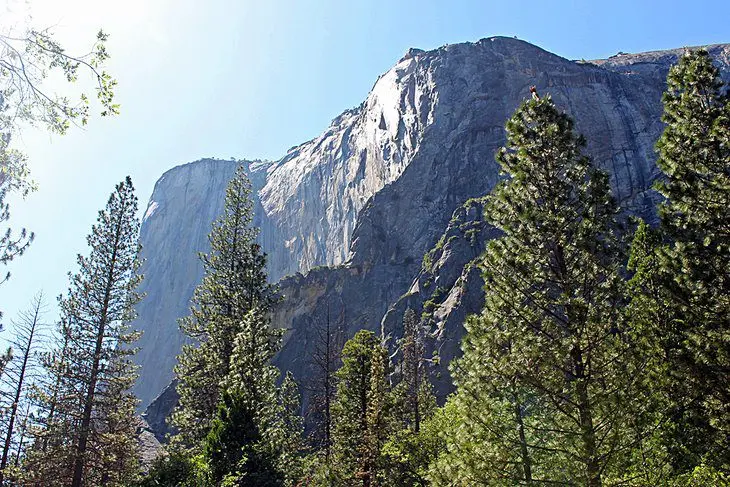
For the adventurous, climbing has always been one of the most popular things to do in Yosemite. Following WWII, climbers descended on the park and agonized over how to ascend the magnificent sheer walls. In their attempts, failures, and eventual successes, they created a cult following in Yosemite like no other climbing area in history.
And all along, campers and hikers have been coming here to lose themselves in the park’s magnificent mountains and valleys.
The most famous and beautiful section of the park is Yosemite Valley, home to big-name tourist attractions, like Half Dome, El Capitan, and Yosemite Falls.
Outside the valley, Glacier Point Road and Tioga Road provide seasonal access to other areas of the park. Glacier Point Road allows access to stunning views over the Yosemite Valley. Tioga Road crosses the park in an east-west direction and runs through alpine scenery, where you can find lovely, and often less busy, hiking trails. Due to the altitude, Tioga Road opens later in the spring than Glacier Point Road.
For more details, have a look at our list of the top attractions and things to do in Yosemite National Park.
1. Yosemite Falls
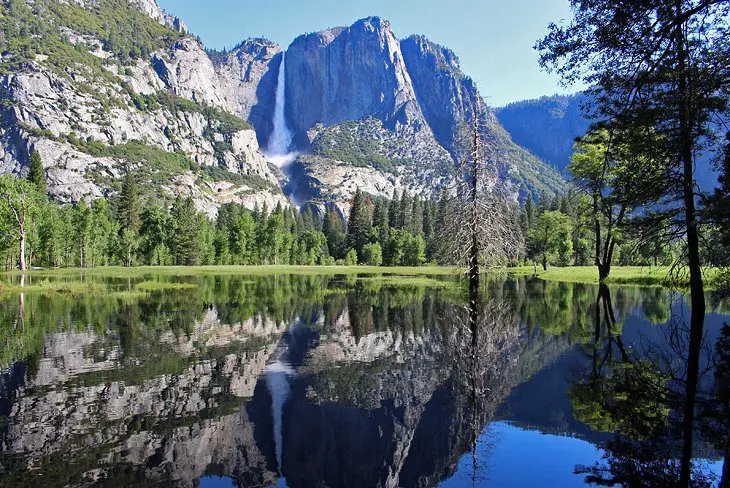
Tumbling over a granite wall and pounding the rocks at the base of the cliff, Yosemite Falls is one of the most memorable and striking features in Yosemite Valley. It’s also among the best waterfalls in California.
Repeatedly popping into view over treetops and around corners as you drive through the valley, the falls look different from every angle, and it’s impossible to take your eyes off.
You don’t have to hike or even get out of your car to appreciate this waterfall, but the most complete view, and one of the best views, of the falls is from the start of the Yosemite Falls hike, along the non-handicapped route on the left side of the river. You can walk right to the base of the falls with minimal effort and feel the mist sweeping over you.
Another outstanding perspective is from the picnic site at the Swing Bridge.
2. Half Dome
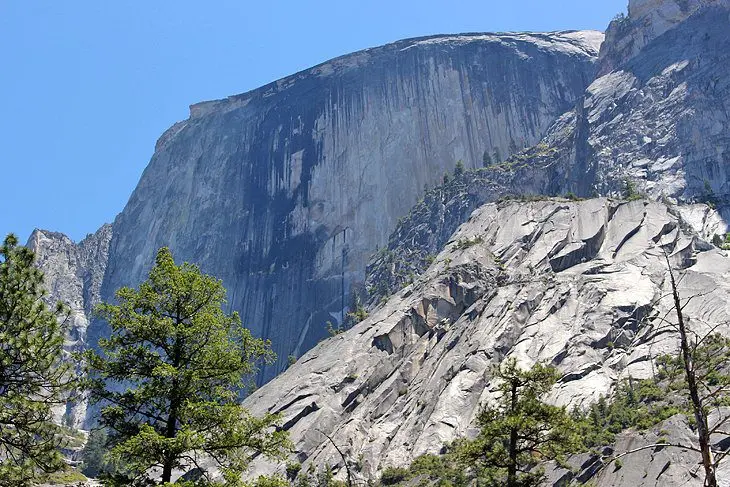
Half Dome is one of Yosemite’s most famous sites and particularly well-known in the climbing world for being one of the first “big climbs.”
This granite icon looks much different depending on the angle you are viewing it from. Looking up at the sheer rock face from the valley, the enormity of the wall is obvious, and you can appreciate why climbers have been drawn here.
You can also see Half Dome in the distance from Tunnel View, but the best place to view it is from the lookout at Glacier Point. From here, you get a true picture of the rock, how it looms over the valley, and how much higher it stands than the surrounding mountains. The dome shape is clearly evident, and you can easily see why it’s called Half Dome.
For close-up views, the Mirror Lake hike is the best option. From this trail, you look almost straight up the rock face.
Adventurous souls can hike up Half Dome. The last portion of this hike takes you up the bald back side of the formation. This isn’t your average hike, and it’s not for everyone. It is considered one of the best hikes in Yosemite, but be sure to look into the details before attempting it.
3. El Capitan
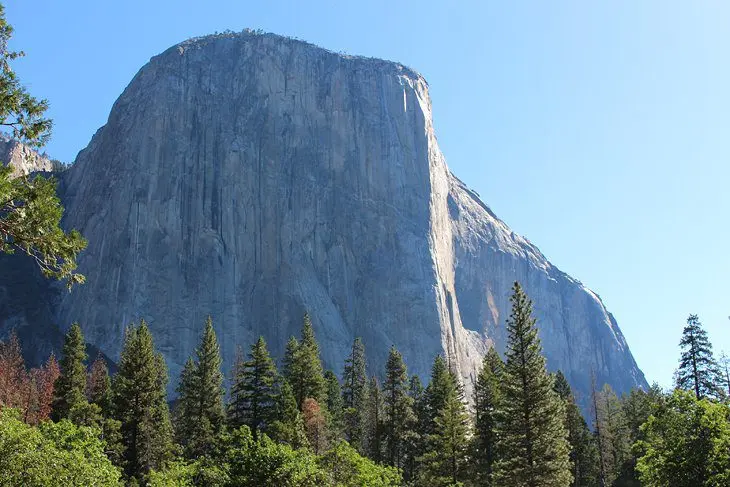
Legendary among climbers, El Capitan is a 3,000-foot sheer rock face on the north side of Yosemite Valley. Although it may not seem like it, El Capitan is actually 1,000 feet higher than the face of Half Dome.
El Capitan gained interest with the free solo climb of Alex Honnold in June of 2017, and the Academy Award winning documentary film, Free Solo. He became the first person to climb El Capitan without ropes, and completely unaided. The climb took three hours and 56 minutes.
From the Tunnel View lookout, El Capitan is the massive cliff on the left side of the valley, standing notably higher than everything else in view from this vantage point.
You can see the wall as you drive through the valley, but many people stop and view it or photograph it from El Capitan Meadow off the North Drive through Yosemite Valley. Since this is a one-way road, it’s best to view it on your way out of the valley. At certain times of day, rangers set up in the meadow and offer talks on El Capitan.
If you want to get up close to the wall or even touch it, you can park on the right side of this same road, beyond the El Capitan picnic area, and walk up to the wall.
The short trail is marked as far as an open field, not far from the face, and rudimentary trails from here lead up through trees and boulders to the base of the wall. Climbers are almost always set up here. This trail is not promoted by the park.
4. Tunnel View
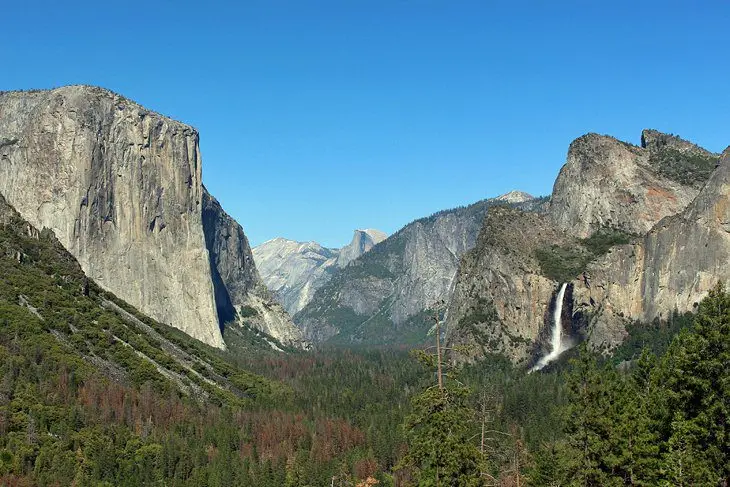
The most classic view of Yosemite Valley is from Tunnel View. This vista, which will feel very familiar to most visitors, stretches out to El Capitan on the left, Bridalveil Fall on the right, Half Dome in the distance, and also takes in the lush valley at the base of the huge granite walls.
Although it’s an incredible sight at any time of day, in the morning, the walls are mostly in shadow. The best time to appreciate this scene is in the afternoon, when the walls are bathed in sunlight.
The parking area is just beyond the tunnel as you enter Yosemite Valley from Wawona Road. If you are heading out to Glacier Point from the valley, you will pass Tunnel View just before you enter the tunnel.
5. Glacier Point
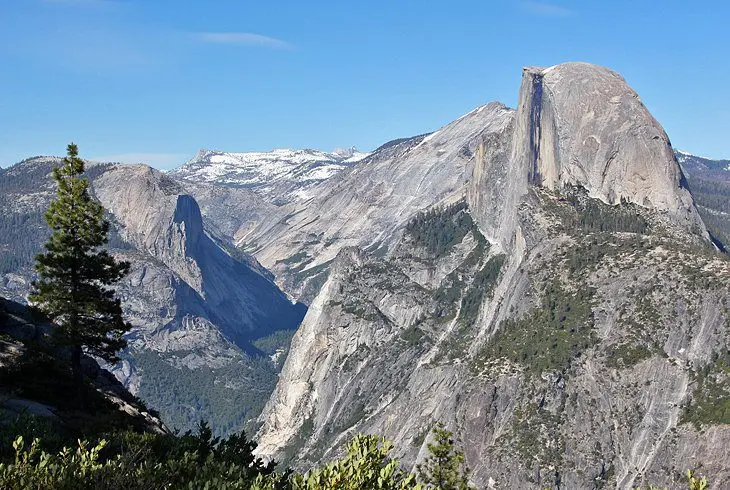
A drive through Yosemite Valley generally entails looking up to see the sites. Glacier Point, at an elevation of more than 7,200 feet, gives you the grand view over the entire valley, as well as many other sites beyond, and provides a whole new perspective.
This is one of the most incredible views in Yosemite National Park and is an absolute must-see sight.
In 2022, the Glacier Point Road closed for a massive construction project. The road, dating from 1936, requires significant structural rehabilitation. The work continues into 2023, however, vehicles will be allowed on the road but significant delays of 30 minutes or more are expected from January through to October. The portion of the road leading to Badger Pass Ski Resort will be open during the ski season.
Typically, the drive from Yosemite Village to Glacier Point takes about an hour, but you’ll also find hikes and other lookouts in the area worth exploring.
Four Mile Trail hike runs from Glacier Point down 3,200 feet to Yosemite Valley, coming out near Sentinel Rock. Despite the name, the trail is almost five miles. It’s also a steep grade and in relatively poor condition.
Not far from Glacier Point, Washburn Point is an equally spectacular lookout with incredible views over Vernal Fall.
6. Bridalveil Falls
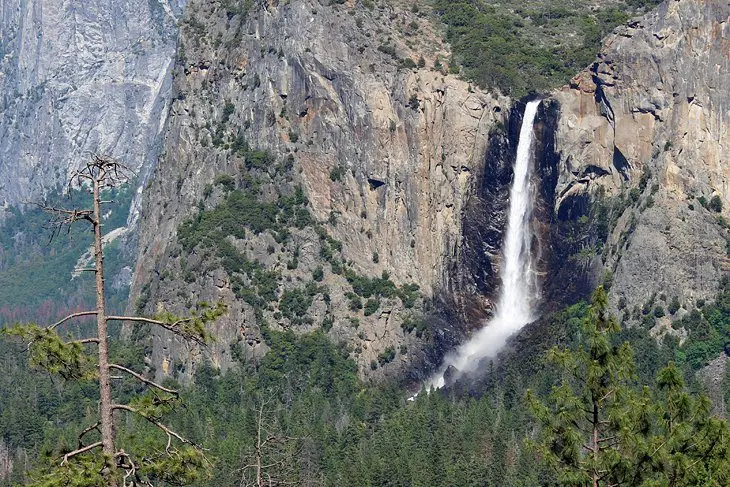
Another classic sight in Yosemite National Park is Bridalveil Fall, on the south side of Yosemite Valley.
In 2019 the park undertook a two-year but long-overdue project to rehabilitate and revitalize this trail, which was truly showing the signs of overuse. It’s expected that the new trails will still deliver you to the base of the falls where you can feel the spray hitting you and hear the pounding water as it crashes on the boulders.
From Tunnel View, you can also get a good look at the falls from a higher vantage point.
Read More: Best Waterfalls in California
7. Hiking
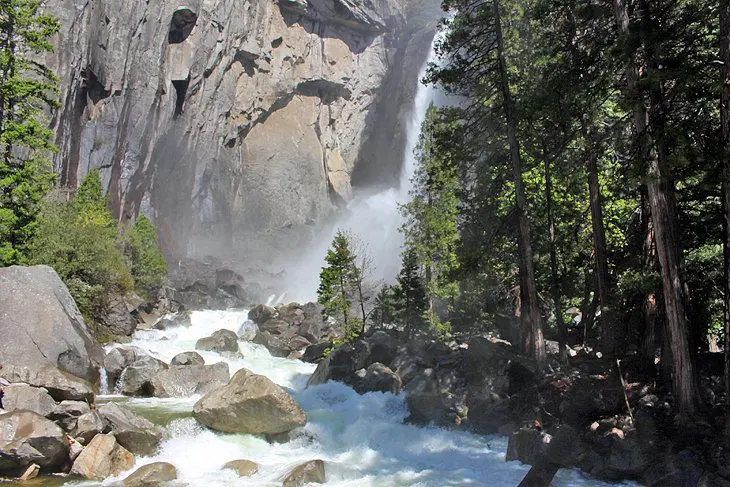
It’s hard to imagine visiting Yosemite without hitting some of the best hiking trails.
The park has a full range of hikes, from quick and easy, including some with wheelchair accessible paths, to full-day or multi-day hikes. The most popular trails involve hiking to waterfalls or out to high overlooks, but you can also hike to alpine lakes and meadows.
The shorter and easier trails in the valley are always the busiest, but it is possible to escape the crowds if you tackle some of the longer hikes, or those with more elevation gain. Hikes along the Tioga Road are also less busy, but only accessible in summer.
One of the park’s most well-known hikes is the hike up Half Dome; a huge day hike with 4,800 feet of elevation gain and an open section with cables (reservations required).
Easier, more family friendly hikes include Mirror Lakes, the hike to the Vernal Fall Footbridge, and beyond the footbridge to the Mist Trail.
In summer, when the Tioga Road is open, you can hike through some beautiful alpine scenery. Also seasonal, but usually with a longer season, the Sentinel Dome and Taft Point hikes along the Glacier Road are popular sunset trails.
If you don’t want to hike alone or would prefer to go with a guide, you can sign up for a Yosemite Hiking Excursion designed to meet your ability .
Read More: Top-Rated Hiking Trails in California
8. Climbing
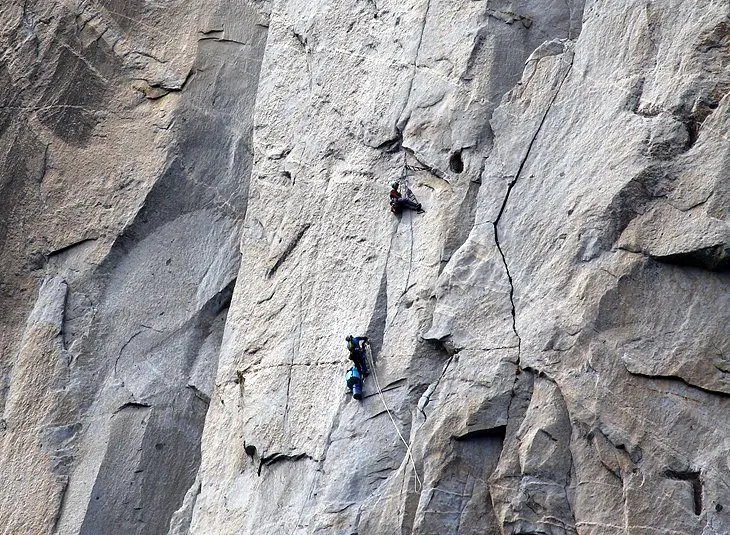
Yosemite is the most famous rock climbing destination in the United States, and for many climbers, it is the pinnacle of their climbing careers. Half Dome and El Capitan have been luring climbers for decades.
Climbing legends and leaders in the sport, like Royal Robbins, Warren Harding, Jim Bridwell, and Alex Honnold, all made names for themselves on Yosemite’s walls.
Camp 4 campground, the place where climbers have been pitching their tents since the 1950s, is listed on the National Register of Historic Places for its significance in the sport of climbing. It’s hard to imagine another location so closely associated with the sport of climbing.
Rock climbing is still as popular as ever in Yosemite, even more so since the release of the documentary film Free Solo, following Alex Honnold’s historic free solo climb of El Capitan in June of 2017.
9. Tioga Road
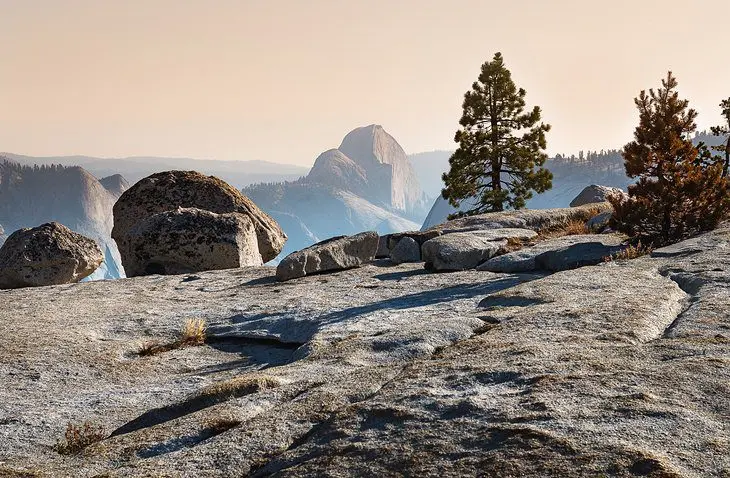
The stunning alpine scenery along Tioga Road, Highway 120, running in an east-west direction through Yosemite, is a wonderful place to visit for summer hiking and camping. Wildflowers bloom in the open meadows, and pristine lakes reflect the mountain peaks.
Due to the elevation, this road is only open in the summer, and it opens later than Glacier Point Road. At the east entrance to the park is Tioga Pass, with an elevation of 9,945 feet.
Highlights along here include the views from Olmsted Point, and Tenaya Lake and the surrounding hiking trails.
Near Tuolumne Meadows, you can hike to Lembert Dome and walk up the swooping back side of the dome.
10. See the Giant Sequoias at Mariposa Grove
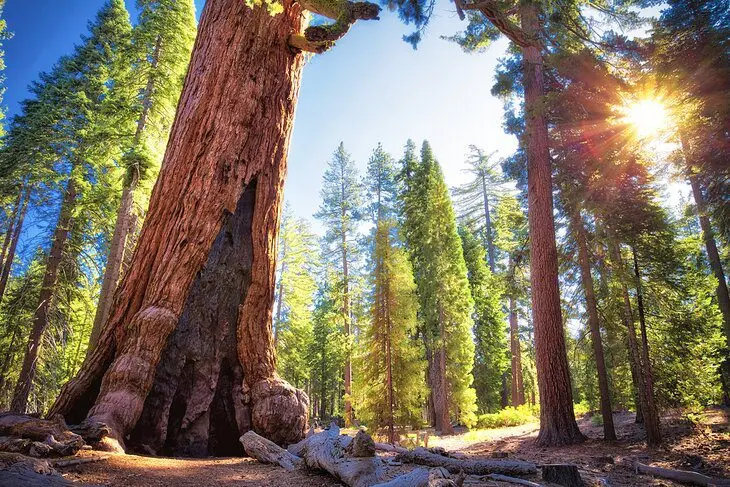
Although Mariposa Grove is located quite a distance from the main attractions in Yosemite, it’s well worth the effort to get there. The size and grandeur of the trees, many of which are over 2,500 years old, is hard to explain unless you’ve actually seen them.
A variety of trails wind their way through the grove and past iconic trees like the Grizzly Giant, the California Tunnel, and Telescope Trees.
If you are up for it, consider hiking the seven-mile round-trip all the way to Wawona Point. Along the way, you’ll pass stunning trees that most people never get to see and be rewarded with incredible views at the end.
To avoid congestion, a shuttle system has been put in place from the main parking area to the trailhead, a distance of two miles.
11. Camping
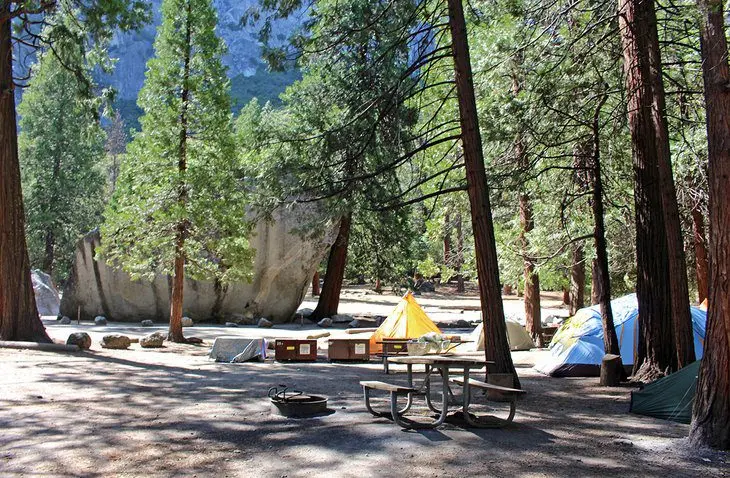
Tourists, families, and climbers have been camping in Yosemite for decades. It’s a great way to experience the park, and it allows you to wake up on-location, ready for a day of exploration or hiking.
The park has some excellent campgrounds to choose from. The most popular campgrounds for visitors are North Pines, Upper Pines, and Lower Pines. Climbers head to the infamous Camp 4. It’s also possible to rent tents and cabins at Curry Village.
If you have your heart set on camping but can’t get a campsite in the park, you can find a few good campgrounds or RV parks outside the gates. For complete details on campgrounds in the park and nearby, see our guide to the best campgrounds at Yosemite National Park.
12. Yosemite Museum and Indian Village
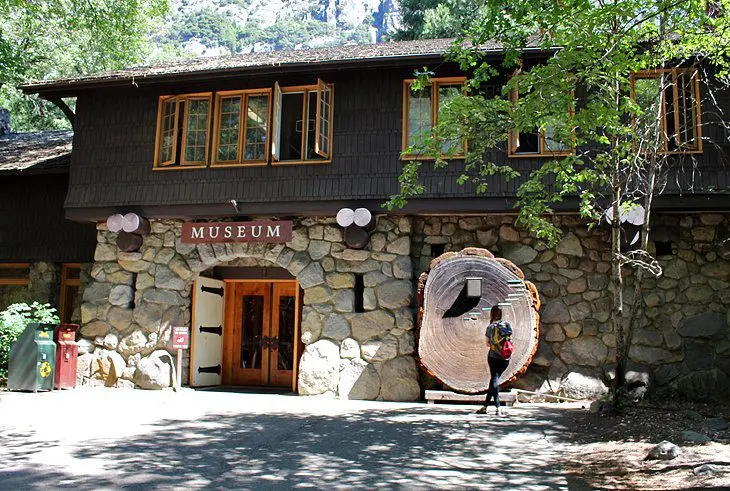
While most people only think of Yosemite’s natural wonders, the Sierra Nevada region in and around Yosemite has been inhabited for more than 3,000 years.
You can learn all about the first peoples of the valley at the Yosemite Museum and Indian Village. The museum displays artifacts, and docents are on hand to give demonstrations and answer questions.
Behind the building are some bark-covered dwellings, built in the traditional style used by the Miwok people, who once lived in the area, as well as their later, Euro-American-style buildings.
The museum is free and conveniently located in Yosemite Village.
13. Biking
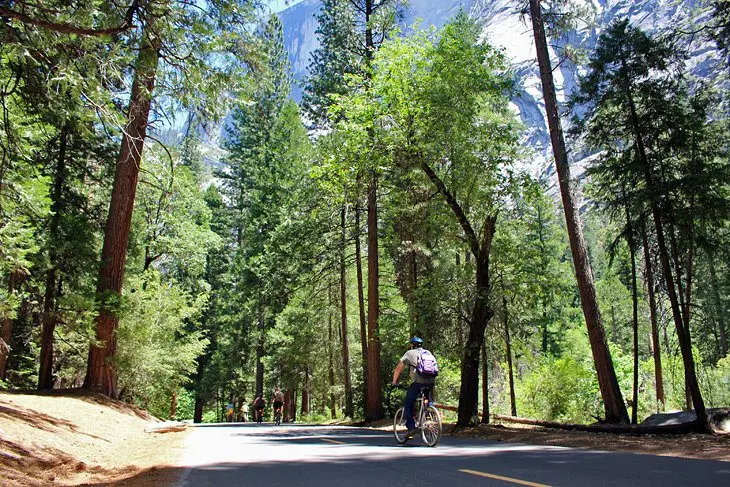
Families looking for things to do in Yosemite may want to consider some easy bike riding. In addition to biking on the roads, the park offers 12 miles of paved paths.
One of the most popular areas for casual biking is along the paved service road on the north side of the river, which leads to Mirror Lake. Many people walk this stretch, but you can easily bike in to the start of the lake and walk the final short portion to the upper section of the lake.
Another loop, east of Curry Village (formerly Half Dome Village), skirts the Upper Pines Campground and runs past the trailhead for Vernal Fall, Nevada Fall, and the John Muir Trail. This road is only open to bikes, pedestrians, shuttle buses, and wheelchair-transporting vehicles. Bicycle rentals are available at Curry Village.
14. Ansel Adams Gallery

Although Ansel Adams’ photography went far beyond Yosemite, his name and works are closely associated with this park, where he created many famous images. His powerful black and white images of Half Dome, Yosemite Valley, and Jeffrey Pine are some of his most well-known works.
The small Ansel Adams Gallery makes an interesting stop if you are in Yosemite Village. Even if you are not looking to buy a piece of art, you may be inspired to create your own masterpieces after seeing some of the artwork on display in this store. The shop sells Ansel Adams original photos, reproductions, posters, books, and more.
Where to Stay near Yosemite National Park
The best place to stay, if it falls within your budget, is right in the park. This allows you to bypass the traffic getting in and out of the park, forget about having to find a parking spot, and it takes the stress out of almost every aspect of a visit to Yosemite.
If staying in the park doesn’t suit your spending plan, you will have to commute. Hotel options near Yosemite are surprisingly limited, but you can find a few good hotels in the nearby small towns.
In the Park:
- For a combination of luxury, convenience, and history, you can’t beat The Ahwahnee , classified by the National Parks system as a Premier Lodge. Built in 1927, this outstanding property, listed on the National Register of Historic Places, and also a National Historic Landmark, is set in the heart of the Yosemite Valley, surrounded by the iconic sites of the park. The stone façade and open-beamed ceilings blend beautifully with the scenery, while the rooms offer modern comfort and elegance.
- Another classic choice is the Wawona Hotel. The hotel was built in 1876 and has been in operation ever since. The rooms are decorated in Victorian style, and many of the 104 rooms have balconies. A nine-hole golf course is across the street.
El Portal:
- One of the best options for people day tripping to Yosemite is the Cedar Lodge in the small town of El Portal, just 30 minutes from Yosemite Village, along Highway 140. This is a mid-range motel-style property with a pool. Rooms are large, and some come with full kitchens and a separate bedroom.
Highway 120 and Groveland:
- Rush Creek Lodge at Yosemite is located along Highway 120, about 50 minutes west of Yosemite Valley. The hotel features rooms and suites with balconies, a large outdoor pool, games room, and restaurant.
- Farther on, in Groveland, The Groveland Hotel is modest but cute.
Oakhurst:
- Although commuting this far makes for a long day trip, you can find some decent hotels in Oakhurst, about a 1.5-hour drive from the main section of the park. Two good options here include the Best Western Plus Yosemite Gateway Inn and the Yosemite Southgate Hotel & Suites .
Map of Yosemite National Park – Attractions & Things to Do
More California Adventures
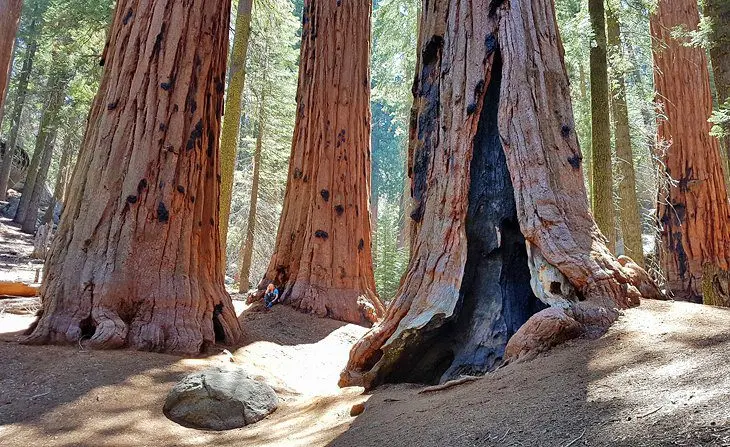
Looking for inspirational travel ideas to add to your bucket list? How about hiking below the tallest trees on the planet in Redwood National and State Parks or camping with the largest trees on Earth in Sequoia National Park and Kings Canyon National Park? These are experiences you won’t forget!
Hit the hiking trails at Lake Tahoe to wander along the shores of the deepest alpine lake in the United States.
To discover the wonders of the desert, head over to the fascinating landscape of Joshua Tree National Park. This park is a true gem, and one that people often forget to include on their itinerary. The park is home to outstanding hiking trails of varying length, perfect for all levels of hikers. Or, plan a bit of time here and camping under the star-filled sky










